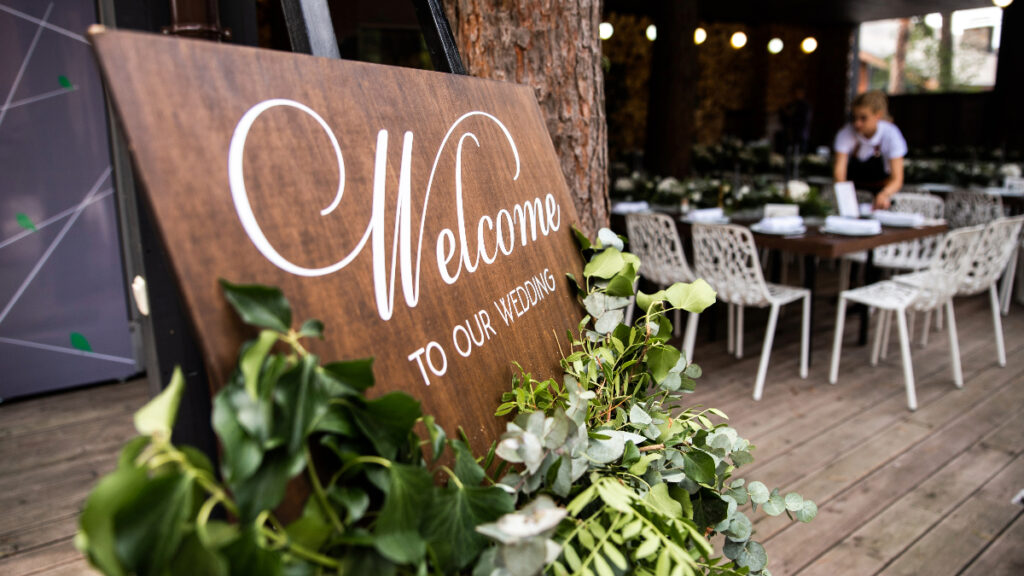Dreaming of saying your vows against a backdrop of a breathtaking European landscape? You’re not alone. Europe, with its rich history, diverse cultures, and stunning locales, stands as a premier destination for couples looking to tie the knot in a place that is both beautiful and steeped in tradition. Yet, as enchanting as destination weddings can be, they come with their own set of challenges, not least of which is managing the guest list.
In this guide, we roll up our sleeves to delve deep into the nitty-gritty of creating a guest list that works for you, helping ensure your European destination wedding is every bit the fairy tale you envision it to be.
▶️ Read also: Hidden costs in planning a destination wedding in Europe
Balancing guest convenience and destination appeal
Planning a destination wedding in Europe indeed opens up a realm of enchanting possibilities, but it also necessitates a thoughtful consideration of the logistics involved, especially concerning your guests. The choice of destination plays a pivotal role in determining the ease of travel and the financial implications for those you wish to have by your side on your special day.
While the allure of a secluded vineyard in the picturesque landscapes of rural France or a historic villa nestled in the heart of Tuscany might be tempting, it is essential to weigh these options against the practicalities of travel and accommodation costs for your guests. Opting for a destination that is well-connected by major transportation networks can significantly ease the travel burden on your guests, ensuring they can reach your wedding venue without undertaking a complex, multi-leg journey.
Moreover, it is worth considering the proximity to major cities or towns where guests can find a range of accommodation options to suit different budgets. For instance, choosing a venue near a city like Barcelona or Lisbon not only offers a rich cultural backdrop for your wedding but also ensures a variety of lodging options, from luxurious resorts to budget-friendly hotels and Airbnb options, giving your guests the flexibility to choose according to their financial comfort.
Furthermore, while it might be your dream to exchange vows on a sun-kissed beach or a historic castle, it is crucial to be mindful of the potential costs involved for your guests, not just in terms of money but also the time commitment. It is a kind gesture to research and possibly arrange transportation options from the nearest city or airport to your wedding venue, facilitating a smoother and less stressful journey for your guests.
In addition to the travel and accommodation aspects, considering the activities and experiences around the destination can also be a thoughtful gesture. While the primary purpose of their visit is to share in your joy, offering suggestions for local attractions or activities can allow them to make the most of their trip without straining their budgets.
In essence, understanding your destination from the perspective of your guests’ convenience and financial comfort is a cornerstone in the planning process. It fosters an environment where your loved ones can celebrate your union with joy and ease, without the overshadowing concerns of logistical hurdles and financial strain. By choosing a destination that respects the distances and budgets of your guests, you pave the way for a celebration that is both joyous and considerate, marking the beginning of your marital journey on a note of warmth and inclusivity.

Assembling your ideal ensemble: Balancing relationships and logistics
Crafting the perfect guest list is perhaps one of the most delicate aspects of planning a destination wedding. It involves a fine balance of including the people who matter most to you while also considering the logistical and financial realities of hosting a wedding abroad. Here, we break down the steps to creating a guest list that suits your wedding to perfection:
- Be realistic about numbers: Destination weddings often imply a more intimate gathering. For instance, if you are eyeing a quaint vineyard in Tuscany that accommodates 50 people, your guest list will need to be tailored accordingly. It’s always a good practice to create a list of non-negotiable attendees – close family and best friends – and then expand it as the venue and budget allow.
- Consider the logistics: When selecting guests, consider their ability to travel and their comfort with the destination chosen. For example, elderly family members might find a beach wedding in Mykonos with its steep streets challenging. In such cases, you might opt for a venue that is accessible and comfortable for everyone.
- Personalised invitations: To add a special touch to your wedding, consider sending out personalised invitations that resonate with the theme and location of your wedding. For instance, if you are having a wedding in the lavender fields of Provence, your invitations might feature a lavender motif and a sprig of dried lavender for that personal touch.
- Children or no children: Another aspect to consider is whether you want to have children at your wedding. Some couples prefer to have an adults-only event, which should be communicated clearly in the invitations. If you decide to include children, ensure that the venue is child-friendly and that there are activities to keep the little ones entertained.
- Plus-ones: Deciding on whether to allow plus-ones can be a tricky situation. A good rule of thumb is to allow plus-ones for guests who are in a serious relationship, engaged, or married. For others, it might depend on the dynamics of your guest list and the kind of atmosphere you wish to create.
- Group dynamics: Consider the group dynamics when creating your guest list. For instance, if you have a group of friends from university who are close-knit, it would be great to invite them all to ensure a lively and joyful atmosphere.
Harnessing digital innovation for your destination wedding
In today’s digital era, technology serves as a pivotal tool in streamlining the intricate process of wedding planning, especially when it comes to destination weddings in Europe. Leveraging technology can not only alleviate the stress associated with planning but also enhance the overall experience for both the couple and the guests.
- Wedding websites: Creating a personalised wedding website is a fantastic way to keep your guests informed and excited about the upcoming celebration. A website can host essential information such as the itinerary, accommodation options, travel details, and local attractions. For instance, platforms like The Knot and Zola offer customizable templates allowing you to share your love story, upload photos, and even manage RSVPs.
- Online RSVPs: Traditional paper RSVPs, while charming, can be cumbersome and slow, especially for guests travelling from different parts of the world. Online RSVPs, integrated into your wedding website, offer a quick and convenient way for guests to confirm their attendance, specify meal preferences, and leave special notes or requests. This digital approach also facilitates real-time tracking, helping you manage numbers and make timely arrangements.
- Virtual planning tools: Platforms like WeddingWire and Pinterest can be invaluable in organising your ideas, connecting with vendors, and managing your budget. These tools offer features like checklists, inspiration boards, and vendor directories, aiding you in bringing your vision to life while keeping track of the myriad details involved in planning a destination wedding.
- Communication apps: Keeping an open line of communication with your guests is crucial. Apps like WhatsApp and Slack can be used to create group chats for different sets of guests, allowing you to share updates, answer queries, and foster a sense of community amongst guests who may not know each other.
- Travel apps: Encourage your guests to use travel apps like Skyscanner and Airbnb to find the best deals on flights and accommodations. These apps can help guests compare prices, explore options, and make bookings, ensuring a smoother and more cost-effective travel experience.
- Digital maps and guides: Providing guests with digital maps and guides of the local area can enhance their experience. Google Maps, for instance, allows you to create custom maps highlighting the venue, accommodations, and points of interest, ensuring guests can navigate the destination with ease.
Managing the guest list for a destination wedding in Europe can be a complex task, but with careful planning and consideration for your guests’ needs and preferences, it can be a rewarding experience. Remember to leverage technology to aid in your planning process and to focus on creating a memorable experience for your guests through unique activities and experiences.






